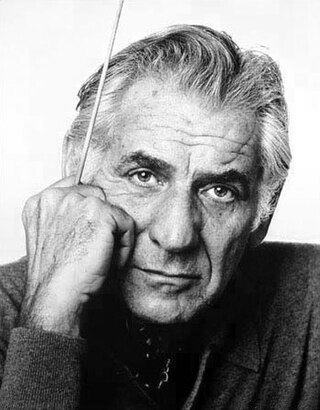Related Research Articles

Leonard Bernstein was an American conductor, composer, pianist, music educator, author, and humanitarian. Considered to be one of the most important conductors of his time, he was the first American-born conductor to receive international acclaim. Bernstein was "one of the most prodigiously talented and successful musicians in American history" according to music critic Donal Henahan. Bernstein's honors and accolades include seven Emmy Awards, two Tony Awards, and 16 Grammy Awards as well as an Academy Award nomination. He received the Kennedy Center Honor in 1981.

The New York Philharmonic, officially the Philharmonic-Symphony Society of New York, Inc., globally known as New York Philharmonic Orchestra (NYPO) or New York Philharmonic-Symphony Orchestra, is a symphony orchestra based in New York City. It is one of the leading American orchestras popularly called the "Big Five". The Philharmonic's home is David Geffen Hall, at New York's Lincoln Center for the Performing Arts.

The Bournemouth Symphony Orchestra (BSO) is an English orchestra, founded in 1893 and originally based in Bournemouth. With a remit to serve the South and South West of England, the BSO is administratively based in the adjacent town of Poole, since 1979.
The Columbia Symphony Orchestra was an orchestra formed by Columbia Records strictly for the purpose of making recordings. In the 1950s, it provided a vehicle for some of Columbia's better known conductors and recording artists to record using only company resources. The musicians in the orchestra were contracted as needed for individual sessions and consisted of free-lance artists and often members of either the New York Philharmonic or the Los Angeles Philharmonic, depending on whether the recording was being made in Columbia's East Coast or West Coast studios.

Conducting is the art of directing a musical performance, such as an orchestral or choral concert. It has been defined as "the art of directing the simultaneous performance of several players or singers by the use of gesture." The primary duties of the conductor are to interpret the score in a way that reflects the specific indications in that score, set the tempo, ensure correct entries by ensemble members, and "shape" the phrasing where appropriate. Conductors communicate with their musicians primarily through hand gestures, usually with the aid of a baton, and may use other gestures or signals such as facial expression and eye contact. A conductor usually supplements their direction with verbal instructions to their musicians in rehearsal.

Serge Koussevitzky was a Russian and American conductor, composer, and double-bassist, known for his long tenure as music director of the Boston Symphony Orchestra from 1924 to 1949.

The São Paulo State Symphony Orchestra is a Brazilian orchestra based in São Paulo. The principal concert venue of OSESP is the Sala São Paulo.

Mass is a musical theatre work composed by Leonard Bernstein with text by Bernstein and additional text and lyrics by Stephen Schwartz. Commissioned by Jacqueline Kennedy, it premiered on September 8, 1971, conducted by Maurice Peress and choreographed by Alvin Ailey. The production used costume designs by Frank Thompson. The performance was part of the opening of the John F. Kennedy Center for the Performing Arts in Washington, D.C. Mass premiered in Europe in 1973, with John Mauceri conducting the Yale Symphony Orchestra in Vienna.

Chichester Psalms is an extended choral composition in three movements by Leonard Bernstein for boy treble or countertenor, choir and orchestra. The text was arranged by the composer from the Book of Psalms in the original Hebrew. Part 1 uses Psalms 100 and 108, Part 2 uses 2 and 23, and Part 3 uses 131 and 133. Bernstein scored the work for a reduced orchestra, but also made a version for an even smaller ensemble of organ, one harp, and percussion.

The Baltimore Symphony Orchestra (BSO) is an American symphony orchestra based in Baltimore, Maryland. The Baltimore SO has its principal residence at the Joseph Meyerhoff Symphony Hall, where it performs more than 130 concerts a year. In 2005, it began regular performances at the Music Center at Strathmore in Bethesda.

Marin Alsop is an American conductor, the first woman to win the Koussevitzky Prize for conducting and the first conductor to be awarded a MacArthur Fellowship. She is music director laureate of the Baltimore Symphony Orchestra and chief conductor of the Vienna Radio Symphony Orchestra, the Ravinia Festival, and the Polish National Radio Symphony Orchestra. She was elected a Fellow of the American Academy of Arts and Sciences in 2008 and to the American Philosophical Society in 2020.
James Tocco is an American concert pianist. He is the youngest of thirteen children born to Vincenzo and Rose Tocco, both Sicilian immigrants.

Leonard Bernstein's Symphony No. 1 Jeremiah was composed in 1942. Jeremiah is a programmatic work, following the Biblical story of the prophet Jeremiah. The third movement uses texts from the Book of Lamentations in the Hebrew Bible, sung by a mezzo-soprano. The work won the New York Music Critics' Circle Award for the best American work of 1944.

The Missa Brevis by Leonard Bernstein is a musical setting of parts of the mass ordinary in Latin for a mixed a cappella choir with countertenor solo and percussion. It is also Bernstein's last complete choral work, due to his death a year after its completion in 1989.
Time Machine for Three Conductors and Orchestra is a two-movement orchestral composition by the American composer Michael Daugherty. The piece was commissioned by the Pittsburgh Symphony Orchestra and premiered November 24, 2003, with the Pittsburgh Symphony Orchestra led by the conductors Mariss Jansons, Lucas Richman, and Edward Cumming.
Javelin is a composition for orchestra by American composer Michael Torke. It was finished in 1994.
Tribute to John F. Kennedy is an address given by American composer and conductor Leonard Bernstein to the United Jewish Appeal of Greater New York on Monday, November 25, 1963 in response to the assassination of President John F. Kennedy; and later reprinted in his book Findings.
The Short Symphony, or Symphony No. 2, is a symphony written by the American composer Aaron Copland from 1931 to 1933. The name derives from the symphony's short length of only 15 minutes. The work is dedicated to Copland's friend, the Mexican composer and conductor Carlos Chávez. The symphony's first movement is in sonata-allegro form, and its slow second movement follows an adapted ternary form. The third movement resembles the sonata-allegro but has indications of cyclic form. The composition contains complex rhythms and polyharmonies, and it incorporates the composer's emerging interest in serialism as well as influences from Mexican music and German cinema. The symphony includes scoring for a heckelphone and a piano while omitting trombones and a percussion section. Copland later arranged the symphony as a sextet.
The Anniversaries are a series of short compositions of easy difficulty for solo piano by American composer Leonard Bernstein. These compositions were written over the course of forty years as gifts for people Bernstein was acquainted or friends with on the occasion of their birthday. The published series comprises the following works:

Divertimento, or Divertimento for Orchestra, is a suite of eight orchestral bagatelles by American composer Leonard Bernstein. Completed in 1980 and written to celebrate the centenary of the Boston Symphony Orchestra, it is well-known for featuring the notes B and C in most of its melodic material.
References
- 1 2 3 4 Paul R. Laird; Hsun Lin (31 July 2019). Historical Dictionary of Leonard Bernstein. Rowman & Littlefield. p. 60. ISBN 978-1-5381-1345-5.
- ↑ Bernstein, Leonard (2013-10-29). The Leonard Bernstein Letters. Yale University Press. p. 774. ISBN 978-0-300-18654-3.
- ↑ Fairman, Richard (28 December 2018). "Leonard Bernstein: orchestral pieces — affectionate vignettes". Financial Times . Retrieved 28 February 2024.